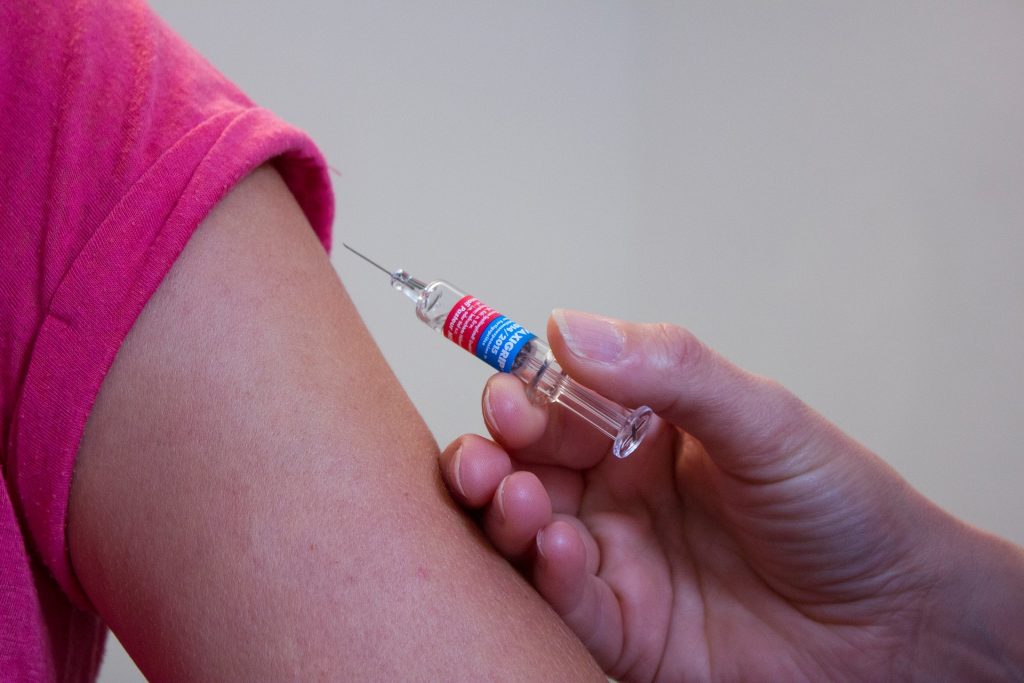
Since the end of the 1960s, the Portuguese State has sold us the vaccine as a real insurance against serious diseases and, over time, has shaped our conscience as an established fact:
“Vaccination is a right and a citizenship duty.”
Therefore, they oblige us to take two vaccines (Diphtheria and Tetanus) and recommend a vaccination plan that, in their opinion, guarantees the health of each citizen and safeguards the community.
Only in the first year of a child’s life, the Portuguese State recommends 17 vaccines to be given (two are mandatory) against 11 potential diseases. This is a recommendation also followed by other countries worldwide. A policy that prompted the World Health Organization to congratulate itself for having avoided at least 10 million deaths between 2010 and 2015.
But there is a dark side of vaccines that the authorities refuse to speak and that raise many doubts:
Are vaccines 100% safe?
Why are the ingredients and components of the vaccines not divulged to the consumer in a clear, transparent and concise way?
Are there any irreversible, immediate or delayed damages caused by vaccines?
And are there any deaths?
Who counts the vaccines victims?
And vibrationally what happens to a child after being vaccinated?
Can I decide not to givevaccines to my children?
Can the school reject a student who does not have a vaccination?
Is it legitimate for society to condemn the option of not vaccinating, even though the Portuguese Constitution enshrines this right?
These are the questions that we will next give some clues, in this and associated texts, but it is up to each one to decide the best for itself and for its family.
Vaccines are not 100% safe

The Directorate-General for Health, an agency headed by the Ministry of Health, says on its website in its “Frequently Asked Questions on Vaccination” booklet that “after so many years of experience and many millions of vaccines administered worldwide, it can be said that vaccines have a high degree of safety, efficacy, and quality. “
The Portuguese State implicitly assumes that there are no 100% safe vaccines, but even so, the authorities do not hesitate to recommend and publicize a vast vaccination plan: until the age of 10. In Portugal, there are only two obligatory vaccines: Diphtheria and Tetanus (Law-Decree No. 44198 of February 20, 1962), and another 15, that are recommended through the national vaccination plan, that if fully complied, means that a child until its 10 years old will take at least 30 stings, as there are some vaccines that are divided into several doses.
“It’s like pouring a bucket of bleach into the body of a newborn child” says a great-grandmother who prefers anonymity. Isabel, a fictitious name, confesses that she also was a child at the death’s door because of an adverse reaction to a vaccine.
“When I was two years old, one week after I was vaccinated, I became so sick that I lost my voice and I stopped walking, having recovered it only more than six months later.” Since then my parents decided not to vaccinate me anymore. Nowadays with more than 70 years old, with many white hairs and a family of my own that is already in the fourth generation, I still do not advise vaccination to anyone.
Like Isabel, there are many other parents in Portugal who, for the sake of their family health, decide to say no to vaccines. According to the authorities, there are about 5% of the babies that are now free of vaccines.
The authorization and surveillance of vaccines in Portugal is the responsibility of the National Authority for Medicines and Health Products (Infarmed), which until today has never detected, at least that has been made public, any connection between the cases of a death that occurred after the administration of vaccines. But Infarmed has already been forced to suspend lots of vaccines several times.
The dark side of vaccines remains hidden in Portugal, although there are press reports of babies who died after vaccination (Setúbal, meningococcal type B vaccine or Loures) and also many pregnant women who lost their baby after vaccination (one of the last cases was against influenza A, in Portalegre), but the Directorate General of Health guarantees that “there are no adverse reactions” that cause death or other serious injuries.
The alarm signals also appear in several countries:
China, Brazil, Philippines, among many others (see also links below).
And then there are other vaccines like anti-influenza: only in 2016/17, there were 1.3 million people, over 65 years old, vaccinated (67% of the universe, see the report, and yet more than 4,500 people died; knowing that the great majority is over 64 years old (read the news here)).
Do the Portuguese have no right to know the margin of error of vaccines and what harm does it cause?
What if your child is in that percentage?
How long will the taboo continue on the dark side of vaccines?
Is there a strong fear of discrediting the alleged success of vaccines and why is it preferable to hide their harm?
The doubts are more than many to put our health and the one of our loved ones, let alone our life, into the hands of others. The decision is up to each one, but be aware that there are no 100% safe vaccines.
Feel more about vaccination in:
France: the cradle of the vaccines where the fear of insecurity is more alive
Sweden is against mandatory vaccines
The United States of America assume that no vaccine is completely safe
Why give immunity to pharmaceuticals?
Does the Portuguese Constitution provide for the right to non-vaccination?
Can I refuse to vaccinate my children?
Can the school reject a student who does not have vaccines?
Reinforce your awareness in:
Vaccins, un génocide planétaire – Dr Christian Tal Schaller
Vaccination, social violence and criminality – Harris Coulter
Vaccination, l overdose – Sylvie Simon
https://www.youtube.com/watch?v=Oi8HGQqWT7I
http://pryskaducoeurjoly.com/actu/1963/les-vaccins-ont-ils-vraiment-eradique-les-maladies-enquete
https://www.dinheirovivo.pt/DVMultimedia/empresas/farmaceuticas/infografia/index.html
http://www.jornalstop.com.br/danos-causados-pelas-vacinas/
http://yournewswire.com/harvard-unvaccinated-children-risk/
https://www.facebook.com/125111167608937/videos/1170898716363505/
https://www.facebook.com/kelly.oliveira.315080/videos/616444268453007/
https://www.youtube.com/watch?v=snEknNLtd8k
https://www.youtube.com/watch?v=hZiSZjp6440
http://pt.euronews.com/2017/05/20/italia-aumenta-para-12-o-numero-de-vacinas-obrigatorias
http://www.eurosurveillance.org/content/10.2807/esm.02.01.00185-pt
http://expresso.sapo.pt/sociedade/2016-06-16-Vacina-BCG-vai-deixar-de-ser-dada-a-todas-as-criancas
http://www.ncbi.nlm.nih.gov/pubmed/12045734
http://www.ncbi.nlm.nih.gov/pubmed/25377033
http://www.ncbi.nlm.nih.gov/pubmed/24995277
http://www.ncbi.nlm.nih.gov/pubmed/12145534
http://www.ncbi.nlm.nih.gov/pubmed/21058170
http://www.ncbi.nlm.nih.gov/pubmed/22099159
http://www.ncbi.nlm.nih.gov/pmc/articles/PMC3364648/
http://www.ncbi.nlm.nih.gov/pubmed/17454560
http://www.ncbi.nlm.nih.gov/pubmed/19106436
http://www.ncbi.nlm.nih.gov/pmc/articles/PMC3774468/
http://www.ncbi.nlm.nih.gov/pmc/articles/PMC3697751/
http://www.ncbi.nlm.nih.gov/pubmed/21299355
http://www.ncbi.nlm.nih.gov/pubmed/21907498
http://www.ncbi.nlm.nih.gov/pubmed/11339848
http://www.ncbi.nlm.nih.gov/pubmed/17674242
http://www.ncbi.nlm.nih.gov/pubmed/21993250
http://www.ncbi.nlm.nih.gov/pubmed/15780490
http://www.ncbi.nlm.nih.gov/pubmed/12933322
http://www.ncbi.nlm.nih.gov/pubmed/16870260
http://link.springer.com/referenceworkentry/10.1007%2F978-1-4614-4788-7_89
http://www.ncbi.nlm.nih.gov/pubmed/19043938
http://www.ncbi.nlm.nih.gov/pubmed/12142947
http://www.ncbi.nlm.nih.gov/pubmed/24675092
http://www.ncbi.nlm.nih.gov/pubmed/25198681
http://www.ncbi.nlm.nih.gov/pmc/articles/PMC3878266/
http://www.ncbi.nlm.nih.gov/pubmed/21623535
http://www.ncbi.nlm.nih.gov/pubmed/25377033
http://www.ncbi.nlm.nih.gov/pubmed/24995277
http://www.ncbi.nlm.nih.gov/pubmed/12145534
http://www.ncbi.nlm.nih.gov/pubmed/21058170
http://www.ncbi.nlm.nih.gov/pubmed/22099159
http://www.ncbi.nlm.nih.gov/pmc/articles/PMC3364648/
http://www.ncbi.nlm.nih.gov/pubmed/17454560
http://www.ncbi.nlm.nih.gov/pubmed/19106436
http://www.ncbi.nlm.nih.gov/pmc/articles/PMC3774468/
http://www.ncbi.nlm.nih.gov/pmc/articles/PMC3697751/
http://www.ncbi.nlm.nih.gov/pubmed/21299355
http://www.ncbi.nlm.nih.gov/pubmed/21907498
http://www.ncbi.nlm.nih.gov/pubmed/11339848
http://www.ncbi.nlm.nih.gov/pubmed/17674242
http://www.ncbi.nlm.nih.gov/pubmed/21993250
http://www.ncbi.nlm.nih.gov/pubmed/15780490
http://www.ncbi.nlm.nih.gov/pubmed/12933322
http://www.ncbi.nlm.nih.gov/pubmed/16870260
http://www.ncbi.nlm.nih.gov/pubmed/19043938
http://www.ncbi.nlm.nih.gov/pubmed/12142947
http://www.ncbi.nlm.nih.gov/pubmed/24675092
http://www.ncbi.nlm.nih.gov/pubmed/25198681
http://www.ncbi.nlm.nih.gov/pmc/articles/PMC2130368/
http://www.ncbi.nlm.nih.gov/pubmed/4016580?dopt=Abstract
http://www.ncbi.nlm.nih.gov/pmc/articles/PMC3170075




